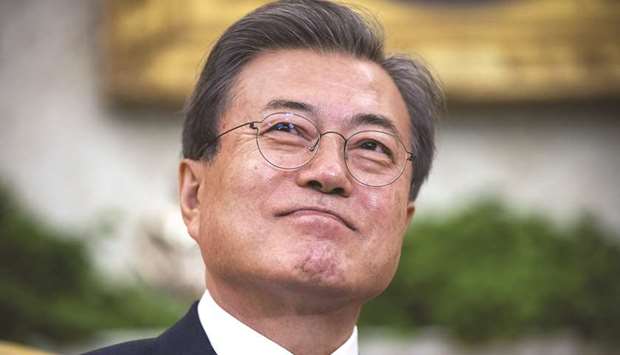South Korean President Moon Jae-in warned Japan that any effort to block his nation’s economic growth “will not succeed,” in the latest escalation of rhetoric between feuding neighbours.
Moon told a cabinet meeting yesterday that he was aware that export restrictions imposed by Japan earlier this month targeted South Korea’s semiconductor industry and “the nation’s core competitiveness.” He expressed confidence that local companies would be able to surmount short-term difficulties to reduce their dependence on Japanese suppliers.
“We will overcome this situation in whatever scenario,” Moon said. “South Korea has come this far by enduring even tougher challenges than this.”
The first face-to-face discussions between Japan and South Korea about the export controls on Friday exposed deep divides between the two US allies, with each side providing differing accounts of what was said. The administration of Japanese Prime Minister Shinzo Abe argues it must impose new licensing requirements on South Korean purchases of three specialty production materials to ensure they don’t fall into the wrong hands.
The move has exacerbated a flare-up in the long-running dispute over whether Japan has sufficiently compensated Koreans who suffered under its 1910-45 occupation of the peninsula. Tokyo, which says the two issues are not linked, has given Seoul until Thursday to meet its demand for third-party arbitration over South Korean court seizures as part of forced-labour cases against Japanese companies.
The dispute comes at a delicate time for Moon, as slumping exports and growing joblessness drag on the South Korean economy. Last week, his government hit the brakes on an ambitious plan to raise the minimum wage in a sign of increasing worries about growth.
Moon has also advised executives from about 30 companies, including Samsung Electronics Co, SK Group, Hyundai Motor Co and Lotte Group, to prepare for a prolonged fight with Japan. Yesterday, he told his cabinet that Japan’s measures could damage its own economy, as South Korean companies sought new suppliers.
“Japan’s export curbs are different from the traditional protectionist trade measures, as well as in purpose,” Moon said. “These measures break the frame of economic co-operation between South Korea and Japan that has been growing on interdependency and common growth for half a century.”
Moon’s warning was echoed by Fitch Ratings, which said in a report yesterday that the efforts to restrict exports could wind up hurting Japanese suppliers of the materials, as well consumer firms. Almost 67% of South Koreans plan to join the “Boycott Japan” movement and stop buying products from their neighbour, a Realmeter survey released on Thursday found.
“Prolonged trade conflict between the two countries could backfire and hurt Japanese companies over the long term,” Fitch said.

Moon: Japan’s measures could damage its own economy, as South Korean companies sought new suppliers.
